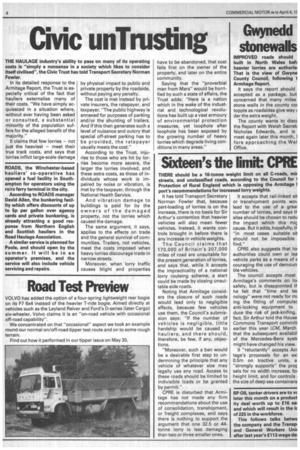Civic unTnisting
Page 6

If you've noticed an error in this article please click here to report it so we can fix it.
THE HAULAGE industry's ability to pass on many of its operating costs is "simply a nonsense in a society which likes to consider itself civilised", the Civic Trust has told Transport Secretary Norman Fowler.
In its detailed response to the Armitage Report, the Trust is especially critical of the fact that hauliers externalise many of their costs. "We have simply acquiesced in a situation where, without ever having been asked or consulted, a substantial minority of the population suffers for the alleged benefit of the majority."
It claims that few lorries — not just the heaviest — meet their true track costs, and says that lorries inflict large-scale damage ROADS, the Winchester-based hauliers' co-operative has opened a fuel facility in Southampton for operators using the roiro ferry terminal in the city.
According to ROADS manager David Allen, the bunkering facility which offers discounts of up to 5p per gallon over agency cards and private bunkering, is already attracting a good response from Northern English and Scottish hauliers in the Road Haulage Association.
A similar service is planned for Poole, and should open by the summer. It will be in an operator's premises, and the service will also include vehicle servicing and repairs. by physical impact to public and private property by the roadside, without paying any penalty.
The cost is met instead by private insurers, the ratepayer, and taxpayer. "The public highway is annexed for purposes of parking and/or the shunting of trailers. And if this then generates such a level of nuisance and outcry that special off-street parking has to be provided, the ratepayer usually meets the cost."
According to the Trust, injuries to those who are hit by lorries become more severe, the larger the lorries involved, and these extra costs, as those of individuals whose work is impaired by noise or vibration, is met by the taxpayer, through the National Health Service.
And vibration damage to buildings is paid for by the owners of the damaged property, not the lorries which caused the damage.
The same argument, it says, applies to the effects on trade and the general survival of communities. Traders, not vehicles, meet the costs imposed when heavy lorries discourage trade in narrow streets.
Moreover, when lorry traffic causes blight and properties












































































































